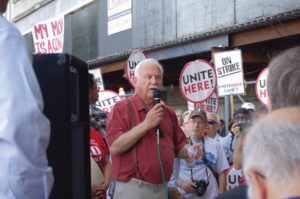Whether surfcasting from Ballston Beach or fly fishing in Argentina, Henry Tamarin seemed happiest when he was by the water with a rod and reel. That was deceptive. A militant and highly successful union leader, he was in his true glory when rallying strikers on a picket line or squeezing concessions out of restaurateurs and hotel owners.

After a life overflowing with activism and anchored to the Outer Cape for more than half a century, Henry died in New York on Aug. 26, 2022. His death was confirmed by his brother-in-law, Stephen Kinzer of Truro. Henry was 77 and had been diagnosed with pancreatic cancer.
One of his last phone calls outside his family was to the Duarte/Downey Real Estate Agency, to report reluctantly that he was forced to cancel the late-August rental reservation in Truro that he had made for himself and his family.
Another final call was from Barack Obama, with whom he had worked when both were active in Chicago politics. He reported that they discussed “nothing related to politics” and spoke instead about their families and the relative merits of Cape Cod and Martha’s Vineyard.
Henry was a leading figure in the union representing hotel and restaurant workers, now known as Unite-Here. He guided tens of thousands of bartenders, servers, bellhops, school cafeteria workers, housekeepers, cooks, cleaners, dishwashers, and other union members, many of them immigrants, toward the middle class. In negotiations that often stretched over months, he extracted guarantees of better health care, improved working conditions, and higher wages from employers ranging from the Hilton and Hyatt chains to posh restaurants like 21 in New York and Gibson’s in Chicago.
Born in Brooklyn, Henry had his first taste of activism in high school when he participated in civil rights marches. He deepened his social consciousness at the University of Wisconsin. Times being what they were, he also immersed himself in the counterculture, living for a time with the Grateful Dead at their San Francisco commune. He was proud of having attended the Washington rally at which Martin Luther King Jr. delivered his “I Have a Dream” speech.
While Henry was working as a community organizer in New Haven during the early 1970s, food service workers at Yale University went on strike. He joined their cause and caught the attention of higher-ups in the union. They wanted to reinvigorate the declining labor movement by tapping into the energy of young people who were protesting the Vietnam War. Henry joined the union in 1973 and devoted himself to its members for the rest of his life.
After stints in New England and Atlantic City, Henry became head of a powerful union local in New York that had been tainted by corruption. He worked with federal monitors, who trusted his honesty as workers trusted his devotion to their cause. His longest assignment was in Chicago, where he ran one of the city’s major unions and mixed with the city’s elite. His influence over the votes of union members, and his control of the union treasury, also made him a sought-after political power broker. He bestowed union support on politicians he judged favorable to labor — meaning among other things that they would show up on picket lines when he called.
A profile in Crain’s Chicago Business called Henry “the never-ending negotiator” and reported, “When the wages aren’t there, Mr. Tamarin is.” Another profile, in the Chicago Tribune, was headlined “Street Fighting Man: How Veteran Organizer Henry Tamarin Got a ‘Dead’ Union Ready to Rumble — and Win.” In it, one union member was quoted saying that a new contract had dramatically improved her life and it all was because “God sent us a man.” Statistics bear her out. When Henry arrived in Chicago in 1999, hotel housekeepers earned $8.83 an hour. A decade later they were earning $14.60 with health care and other benefits. Now their hourly wage is $23.
“That begins to get our membership to the middle class,” he told an interviewer.
After Henry’s death, the Chicago Federation of Labor passed a resolution describing him as “a smart, colorful, and tenacious contract negotiator … a warrior for better wages and working conditions who dedicated his entire life to fight for working women and men.”
Henry confessed to being married to the union, but he was also wed twice. His first wife, Renée Poirier, is the mother of their two children, Nathanael and Nicholas. They survive him, as do three grandchildren and his sister, Jean.
After his divorce, Henry married Jane Kinzer of Truro. Their night-before-the-wedding party was a bash thrown by Ciro Cozzi at his Provincetown restaurant; Ciro warned Henry that he must not try to unionize the servers. The marriage ceremony was beside the Pamet River, and the honeymoon was a fly-fishing trip to Montana.
Fish had little reason to fear Henry. He enjoyed communing with nature at least as much as catching fish and was in any case a confirmed catch-and-release man. His other extra-curricular passion was cuisine, encouraged by his second wife, who had been a chef. They took a pizza-eating tour of Italy, and he considered the fried clams at PJs in Wellfleet to be a little taste of heaven.
Henry devoted his boundless energy to improving the lives of working people. His bubbly, outgoing personality and his sustained outrage at injustice endeared him to the hotel and restaurant workers to whom he was devoted. Loving the Outer Cape helped round out his life. He has chanted “No Justice, No Peace!” for the last time.



